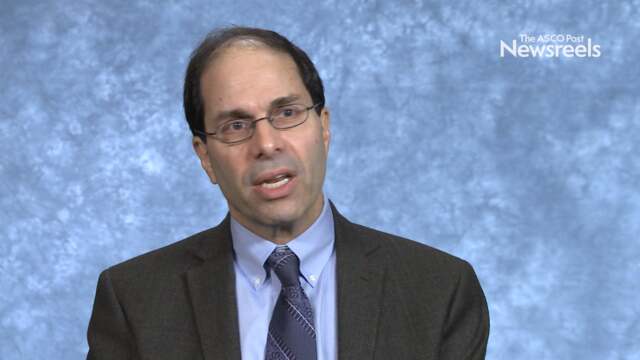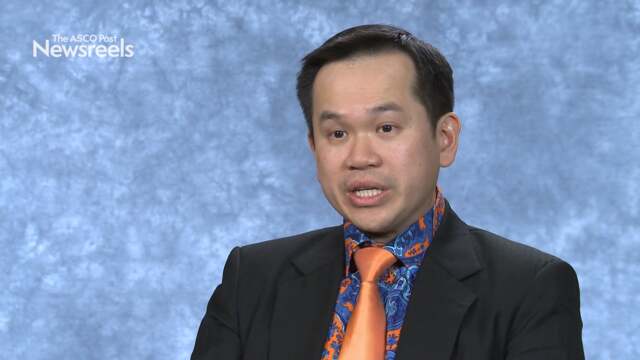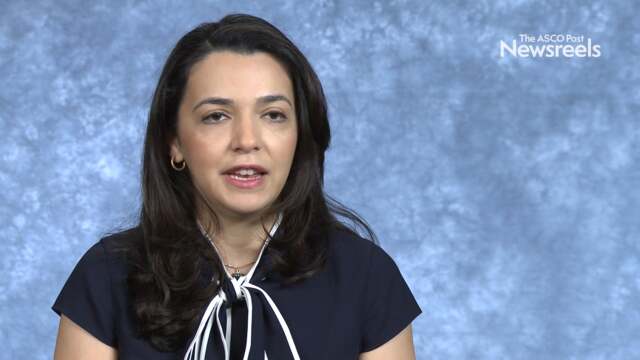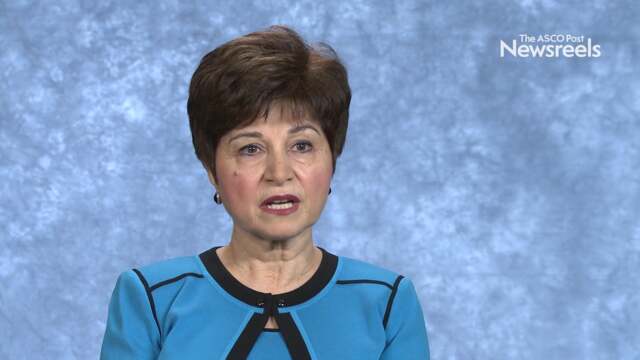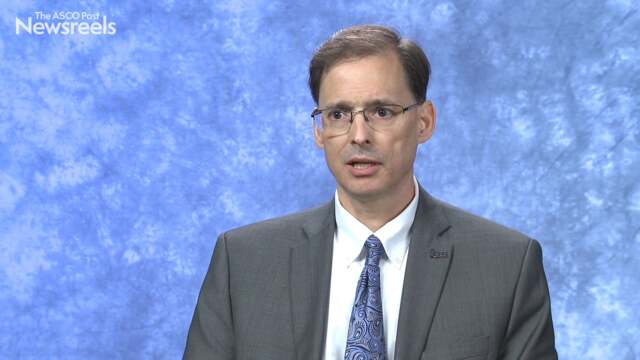Concordance of Non–Low-Risk Prostate Cancer Among Brother Pairs
In a Swedish study reported in the Journal of Clinical Oncology, Jansson et al identified an increased risk of non–low-risk prostate cancer among men with prostate cancer who had with brothers diagnosed with non–low-risk disease. Study Details The study involved 4,262 pairs of...
ESTRO 37: Ultrahypofractionated Radiotherapy for Prostate Cancer Is Safe and Effective
Radiotherapy given in high doses over a shorter period of time is safe and effective for patients with prostate cancer, according to research from a phase III trial presented at the European Society for Radiotherapy & Oncology (ESTRO) 37 Conference (Abstract OC-0599). The...
Long-Term Outcomes of Adjuvant Treatment in High-Risk Prostate Cancer
As reported by Hussain et al in the Journal of Clinical Oncology, long-term follow-up of the phase III SWOG S9921 trial showed that the addition of adjuvant mitoxantrone and prednisone (MP) to androgen-deprivation therapy (ADT) did not improve survival and increased death from other malignancies in ...
Low-Dose Abiraterone With Food vs Standard-Dose Abiraterone in Castration-Resistant Prostate Cancer
In a phase II trial reported in the Journal of Clinical Oncology, Szmulewitz et al found that low-dose abiraterone (Zytiga) given with a low-fat meal was noninferior to standard-dose abiraterone in the fasting state with regard to reduction in prostate-specific antigen (PSA) levels among patients...
ASCO Clinical Practice Guideline: Optimizing Anticancer Therapy in Metastatic Noncastrate Prostate Cancer
As reported in the Journal of Clinical Oncology by Michael J. Morris, MD, of Memorial Sloan Kettering Cancer Center and Weill Cornell Medicine, and colleagues, ASCO has released a clinical practice guideline on optimizing anticancer therapy in men with metastatic noncastrate prostate cancer. To...
GU Symposium Focuses on Prognostic Model in Urothelial Cancer, Novel Therapies for Prostate and Kidney Cancers
THE 2018 GENITOURINARY Cancers Symposium hosted an international audience of oncologists and other stakeholders to hear about the latest advances in the field. We have included coverage of many of the top news stories from the meeting in previous issues of The ASCO Post. Here are summaries of a few ...
MRI-Targeted vs Standard Biopsy in Prostate Cancer Diagnosis
In the international PRECISION trial reported in The New England Journal of Medicine, Kasivisvanathan et al found that magnetic resonance imaging (MRI)-targeted biopsy resulted in a significantly higher rate of diagnosis of clinically significant prostate cancer and a lower rate of diagnosis of...
Long-Term Outcomes With Standard vs Dose-Escalated Radiation Therapy in Intermediate-Risk Prostate Cancer
As reported in JAMA Oncology by Michalski et al, long-term follow-up in the NRG Oncology/RTOG 0126 trial showed no significant difference in overall survival with dose-escalated vs standard-dose radiotherapy in patients with intermediate-risk prostate cancer. High-dose radiotherapy was associated...
Quality of Life With Chemohormonal Treatment in Prostate Cancer
In the E3805 trial reported in the Journal of Clinical Oncology, Morgans et al found that chemohormonal therapy with docetaxel and androgen-deprivation therapy (ADT) was associated with poorer quality of life (QOL) at 3 months but better QOL at 12 months vs ADT alone in metastatic hormone-sensitive ...
Analyses of Radiographic Progression-Free Survival in Metastatic Castration-Resistant Prostate Cancer
As reported in JAMA Oncology by Rathkopf et al, sensitivity analyses of radiographic progression-free survival in the PREVAIL trial comparing enzalutamide vs placebo in metastatic castration-resistant prostate cancer support use of the measure as a clinically meaningful endpoint in trials in this...
James L. Mohler, MD, on Prostate Cancer: Management Approaches
James L. Mohler, MD, of Roswell Park Cancer Institute, discusses personalized medicine, molecular risk stratification, and better androgen-deprivation therapy for men with prostate cancer.
Long-Term Outcome With Finasteride Using Medicare Claims Linked to the Prostate Cancer Prevention Trial
In a study reported in the Journal of the National Cancer Institute, Unger et al linked data from the Prostate Cancer Prevention Trial (PCPT) with Medicare claims and found that finasteride treatment was associated with a maintained reduction in prostate cancer risk after discontinuation of the...
EAU 2018: Prostate MRI Reveals More Clinically Significant Cancers, Reduces Overdiagnosis Compared to Standard Biopsy
A large international study has shown that magnetic resonance imaging (MRI) can reduce the number of invasive prostate biopsies by up to 28%. The PRECISION trial showed that using MRI to target prostate biopsies leads to more harmful and fewer harmless prostate cancers being diagnosed. The results...
EAU 2018: Survey Shows Greater Suicide Rate in Patients With Urologic Cancers
A major UK survey has shown that patients with urologic cancer—such as prostate, bladder, or kidney cancer—are five times more likely to commit suicide than people without cancer. The analysis also shows that patients with cancer generally are around three times more likely to commit...
Effect of Single PSA-Based Screening on Prostate Cancer Mortality
In the UK-based CAP trial reported in JAMA, Martin et al found that a single prostate-specific antigen (PSA) screening was not associated with better 10-year prostate cancer-specific survival vs the standard practice of no screening. Screening was associated with greater detection of prostate...
FDA Grants Priority Review to sNDA for Enzalutamide in Nonmetastatic Castration-Resistant Prostate Cancer
On March 19, a supplemental New Drug Application (sNDA) for enzalutamide (Xtandi) was accepted for filing and granted Priority Review designation by the U.S. Food and Drug Administration (FDA). If approved, the sNDA would expand the indication of enzalutamide to include men with nonmetastatic...
Study Finds Shared Decision-Making Still Lacking in Prostate Cancer Screening
A new study found many men receiving prostate-specific antigen (PSA) testing do so without a comprehensive shared decision-making process, contrary to current guidelines. The American Cancer Society study, published by Fedewa et al in Annals of Family Medicine, found that in both 2010 and 2015,...
Targetable Immune Biology Found in Some Patients With Early-Stage Prostate Cancer
Although immunotherapy has improved outcomes across a growing number of cancers, its success in unselected cases of prostate cancer has been limited. According to data presented at the 2018 ASCO-SITC Clinical Immuno-Oncology Symposium, however, investigators have identified a group of patients with ...
Small Study Evaluates Novel Combination in Metastatic Prostate Cancer
The combination of the poly ADP-ribose polymerase (PARP) inhibitor olaparib (Lynparza) and the programmed cell death ligand 1 (PD-L1) inhibitor durvalumab (Imfinzi) produced positive preliminary results in men with metastatic, castration-resistant prostate cancer previously treated with...
MRI-Based Model for Prostate Biopsy Risk Stratification
In a study reported in JAMA Oncology, Mehralivand et al found that inclusion of magnetic resonance imaging (MRI) findings in a predictive model may reduce unnecessary biopsies in men with suspected prostate cancer. Study Details In the study, a predictive model adding MRI-derived prostate volume...
Survival With Brachytherapy-Based Radiotherapy or Radical Prostatectomy in High-Risk Localized Prostate Cancer
In a study of National Cancer Database data reported in the Journal of Clinical Oncology, Ennis et al found no significant survival differences between patients receiving brachytherapy-based radiotherapy vs radical prostatectomy in men with high-risk localized prostate cancer. Study Details The...
Novel PET Imaging Agent Targets Copper in Tumors, Allowing Early Detection of Prostate Cancer Recurrence
An Italian study featured in The Journal of Nuclear Medicine demonstrates that a novel nuclear medicine imaging agent targeting copper accumulation in tumors can detect prostate cancer recurrence early in patients with biochemical relapse (ie, rising prostate-specific antigen [PSA] level). Copper...
EXPERT POINT OF VIEW: Philip Kantoff, MD
PHILIP KANTOFF, MD, of Memorial Sloan Kettering Cancer Center, New York, was the formal discussant of both trials. “At first glance, these are two positive trials,” Dr. Kantoff said. Although he praised the results, he said that overall survival is the best demonstration of clinical benefit, and ...
Apalutamide, Enzalutamide Improve Metastasis-Free Survival in Nonmetastatic Castrate-Resistant Prostate Cancer
IN TWO SEPARATE TRIALS presented at the 2018 Genitourinary Cancers Symposium, apalutamide and enzalutamide (Xtandi), respectively, reduced the risk of metastasis and prolonged metastasis-free survival in men with high-risk nonmetastatic castrate-resistant prostate cancer. In the SPARTAN trial,1,2...
New Agents for Initial Treatment of Metastatic Prostate Cancer: A New Standard of Care?
FOR DECADES, the status of metastatic prostate cancer trials was not particularly exciting. With an absence of high-impact novel agents, the focus of cancer trial groups was on the improvement of standard care. Well-crafted, large trials of hormonal therapy demonstrated the utility of combined...
Multimodal Treatment in Patients With Gleason Score 9–10 Prostate Cancer
University of California, Los Angeles (UCLA) researchers have discovered that a combination of high doses of radiotherapy and hormonal therapy provides the best chance of decreasing the mortality rate in men with aggressive prostate cancer. The findings, published by Kishan et al in JAMA, also...
SPARTAN Trial: Metastasis-Free Survival in Nonmetastatic Castration-Resistant Prostate Cancer
As reported by Smith et al in The New England Journal of Medicine, the phase III SPARTAN trial has shown that the androgen receptor inhibitor apalutamide (Erleada) produces significant improvement in metastasis-free survival and time to symptomatic progression vs placebo among men with...
FDA Approves Abiraterone Acetate Plus Prednisone for High‑Risk Metastatic Castration-Sensitive Prostate Cancer
ON FEBRUARY 7, 2018, the U.S. Food and Drug Administration (FDA) approved abiraterone acetate (Zytiga) tablets in combination with prednisone for metastatic high-risk castration-sensitive prostate cancer. The FDA initially approved abiraterone acetate with prednisone in 2011 for patients with...
Combined Medical and Psychological Approach May Help Couples Reclaim Intimacy After Prostate Cancer Treatment
“To what extent do treatments for prostate cancer impact sexual functioning? To a great extent,” Christian Nelson, PhD, Chief, Psychiatry Service, Memorial Sloan Kettering Cancer Center, New York, told participants at the 11th Annual Oncofertility Consortium Conference in Chicago.1 Most men with...
Long-Term Survival Outcomes With Chemohormonal Therapy in Metastatic Hormone-Sensitive Prostate Cancer
Analysis of long-term survival outcomes in the phase III CHAARTED trial showed a survival advantage with the addition of docetaxel to androgen-deprivation therapy (ADT) in patients with hormone-sensitive metastatic prostate cancer, although no advantage was observed among patients with low-volume...
FDA Approves Apalutamide for Nonmetastatic, Castration-Resistant Prostate Cancer
The U.S. Food and Drug Administration (FDA) today approved apalutamide (Erleada) for the treatment of patients with prostate cancer that has not spread, but that continues to grow despite treatment with hormone therapy. This is the first FDA-approved treatment for nonmetastatic,...
Eric J. Small, MD, on Prostate Cancer: Results From the SPARTAN Trial
Eric J. Small, MD, of the University of California, San Francisco, discusses phase III findings on apalutamide vs placebo in patients with nonmetastatic castration-resistant prostate cancer (Abstract 161).
Paul L. Nguyen, MD, on Prostate Cancer: Abstract Roundup
Paul L. Nguyen, MD, of the Dana-Farber Cancer Institute, summarizes a session he chaired on prostate cancer, which included discussion of daily vs weekly image-guided radiotherapy; a biomarker to predict biochemical failure and metastasis; a comparison of abiraterone or enzalutamide activity; and the impact of 18F-fluciclovine PET/CT on clinical management choices for men with biochemically recurrent disease (Abstracts 4, 5, 164, 165).
Fatima Karzai, MD, on Prostate Cancer: Treatment Study Results
Fatima Karzai, MD, of the National Institutes of Health, discusses phase II findings on olaparib and durvalumab in metastatic castration-resistant prostate cancer in an unselected population (Abstract 163).
Nicholas D. James, MBBS, PhD, on Prostate Cancer: Results From the STAMPEDE Trial
Nicholas D. James, MBBS, PhD, of University Hospitals Birmingham NHS Foundation Trust, discusses study findings on the addition of docetaxel to first-line hormone therapy in prostate cancer, an analysis focusing on cost-effectiveness and long-term and quality-adjusted survival (Abstract 162).
Maha Hussain, MD, on Prostate Cancer: Results From the PROSPER Trial
Maha Hussain, MD, of Northwestern University, discusses phase III findings on enzalutamide in men with nonmetastatic castration-resistant prostate cancer (Abstract 3).
Robert G. Bristow, MD, PhD, on Prostate Cancer: Keynote Lecture
Robert G. Bristow, MD, PhD, of Manchester Cancer Research Centre, discusses germline and somatic mutations; new ways to generate biomarkers that may describe tumor complexity; and how, in the future, this information may help triage patients with aggressive prostate tumors to intensified treatments.
2018 GU CANCERS SYMPOSIUM: Antiandrogenic Therapy in Nonmetastatic Castration-Resistant Prostate Cancer
Results from the phase III PROSPER trial in patients with nonmetastatic castration-resistant prostate cancer were presented by Hussain et al at the 2018 Genitourinary Cancers Symposium (Abstract 3). The results show that the use of enzalutamide (Xtandi) plus androgen-deprivation therapy (ADT)...
FDA Approves Abiraterone Acetate in Combination With Prednisone for High-Risk Metastatic Castration-Sensitive Prostate Cancer
On February 7, 2018, the U.S. Food and Drug Administration (FDA) approved abiraterone acetate (Zytiga) tablets in combination with prednisone for metastatic high-risk castration-sensitive prostate cancer. The FDA initially approved abiraterone acetate with prednisone in 2011 for patients with...
Differentiating Cancerous Prostate Tissue From Benign Tissue
Using nuclear medicine, German researchers may have found a way to accurately differentiate cancerous tissue from healthy tissue in prostate cancer patients. The research is highlighted in findings published by Rahbar et al in The Journal of Nuclear Medicine. These new findings demonstrate that...
2018 GU CANCERS SYMPOSIUM: Chemotherapy Added to Hormone Therapy for Prostate Cancer Improves Quality of Life
A new analysis of the ongoing STAMPEDE clinical trial found that adding docetaxel to hormone therapy for advanced prostate cancer improves quality of life and lowers the need for subsequent therapy. Docetaxel was also found to be cost-effective. These findings will be presented by James et al at...
2018 GU CANCERS SYMPOSIUM: Apalutamide Delays Prostate Cancer Metastases by More Than 2 Years
Findings from the phase III placebo-controlled SPARTAN trial suggest that apalutamide is an effective treatment for men with nonmetastatic castration-resistant prostate cancer who are at high risk for developing metastatic disease and for whom no approved treatments exist. Men who received...
Obese Men May Have Higher Risk for Biochemical Recurrence Following Radical Prostatectomy
Among men with prostate cancer who underwent radical prostatectomy, those who were obese had a higher risk of biochemical recurrence, according to data presented at the American Association for Cancer Research (AACR) Special Conference on Obesity and Cancer: Mechanisms Underlying Etiology and...
Patient-Reported Outcomes With Addition of Combination Treatment to ADT in Newly Diagnosed Metastatic Castration-Naive Prostate Cancer
As reported by Chi et al in The Lancet Oncology, the addition of abiraterone and prednisone to androgen-deprivation therapy (ADT) in the phase III LATITUDE trial was associated with improved patient-reported outcomes in patients with newly diagnosed metastatic castration-naive prostate cancer. The...
James L. Gulley, MD, PhD, on Prostate Cancer: Expanding Immunotherapy Options
James L. Gulley, MD, PhD, of the National Cancer Institute, discusses combined treatment approaches showing early evidence of clinical activity: agents such as vaccines or PARP inhibitors that can initiate an immune response, paired with agents such as checkpoint inhibitors that can facilitate the activity of tumor-directed immune cells.
Internationally Renowned Prostate Cancer Expert Gerald E. Hanks, MD, Dies
FROM WILHELM RÖNTGEN’S groundbreaking discovery of x-rays in 1895, the history of radiotherapy has been rich with colorful paradigm-changing researchers and physicians who over the past century have transformed the field into one of the pillars of cancer treatment. One such trailblazer who...
Pomegranates and Other Polyphenols: New Evidence to Share With Prostate Cancer Patients
The ASCO Post’s Integrative Oncology series is intended to facilitate the availability of evidence-based information on integrative and complementary therapies commonly used by patients with cancer. In this installment, Channing Paller, MD, explores the role of pomegranate- and grape-based...
CTC Number May Be Marker of Improved Survival in Metastatic Castration-Resistant Prostate Cancer
In a study reported in the Journal of Clinical Oncology, Heller et al identified two circulating tumor cell (CTC) markers that had high discriminatory ability for improved survival in metastatic castration-resistant prostate cancer. Study Details The study used individual patient data from 5...
PSA at 7 Months and Prognosis in Metastatic Hormone-Sensitive Prostate Cancer Treated With ADT With or Without Chemotherapy
In a study reported in the Journal of Clinical Oncology, Harshman et al found that a prostate-specific antigen (PSA) level ≤ 0.2 ng/mL at 7 months after the start of androgen-deprivation therapy (ADT) was significantly associated with longer overall survival in metastatic...
PARP1 and Androgen Receptor Inhibition in Metastatic Castration-Resistant Prostate Cancer
In a phase II trial (NCI 9012) reported in the Journal of Clinical Oncology, Hussain et al found no benefit of adding PARP1 inhibition with veliparib to abiraterone (Zytiga) plus prednisone in patients with metastatic castration-resistant prostate cancer. ETS fusion status was not predictive of...

